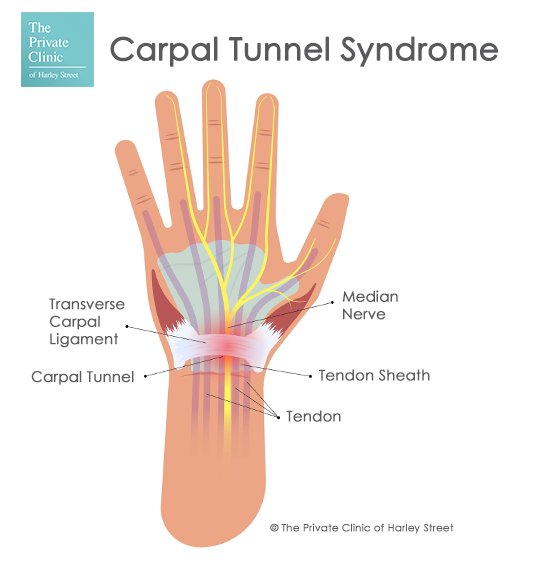
- Carpal Tunnel Syndrome treatment performed in Leeds
- Minimally invasive, day-case surgery
- Relieves pressure and treats carpal tunnel symptoms
What’s on this page
Medically reviewed by Lorcan Sheppard BSc MBBS FRCA, Chief Medical Officer for The Private Clinic.
Last Reviewed January 17th 2023
Related Treatments
Carpal Tunnel Syndrome
Carpal tunnel syndrome is a common condition that affects either one or both hands, wrists, and arms. You may experience pain, weakness or numbness in your wrist or hand which can then progress up the arm.
What causes Carpal Tunnel Syndrome?
Carpal Tunnel Syndrome occurs when there is pressure on the median nerve. The median nerve runs down your arm to your wrist and through a narrow passageway which is known as the carpal tunnel to your hand.
The median nerve provides sensory and motor actions to your forearm, hand and wrist and is responsible for controlling the movements and feelings in your thumb and fingers aside from the pinkie finger.
Carpal tunnel syndrome is caused by the carpal tunnel narrowing due to being squeezed or pinched. This could be as a result of:
- Injury or Trauma
- Inflammatory Diseases
- Repetitive Hand Motions
You are also more at risk of developing carpal tunnel if you are overweight, pregnant, have a close relative with carpal tunnel or have a condition like diabetes, rheumatoid arthritis, and hypothyroidism.

What are the symptoms of Carpal Tunnel?
The symptoms of carpal tunnel tend to start gradually and can often be present for months or years without the condition worsening. Some patients may find that symptoms vary depending on time of day, activity levels and position of the wrist. Typical carpal tunnel symptoms include:
- Burning sensation
- Tingling
- Numbness
- Swollen feeling but not physically showing signs of swelling
- Pins and Needles
- Aches and Pain
Carpal tunnel can be tricky to diagnose sometimes as it does share symptoms with many other conditions such as repetitive strain injury, wrist tendonitis, arthritis and thoracic outlet syndrome. A consultation with our expert consultant hand surgeon will be the best place first to diagnose carpal tunnel and advise on the best treatment.
Does Carpal Tunnel need to be treated?
Carpal tunnel can improve and resolve itself in a few months without treatment however this is usually when it is caused by lifestyle factors such as pregnancy and obesity.
When left untreated, there is a risk that carpal tunnel symptoms can become more severe with loss of sensation to the fingertips and strength of the hand becoming reduced. Taking action in the early stages of carpal tunnel often means your treatment is going to be more successful as nerve damage can be difficult to reverse.
How to treat Carpal Tunnel?
There are lots of methods for treating carpal tunnel or reducing the symptoms of carpal tunnel which include a range of non-surgical and surgical methods.
Carpal tunnel treatments include:
- Wrist Splint – Helps to relieve pressure on the affected nerve. Needs to be worn for at least 4 weeks before improvement is likely to be noticed.
- Hand Exercises – These can help to reduce the symptoms caused by carpal tunnel and are often recommended alongside additional treatment.
- Steroid Injections – Injection into the affected area to reduce swelling around the nerve. This treatment may need to be repeated every few months.
- Endoscopic Carpal tunnel decompression – Surgery performed under local anaesthetic which releases the pressure within the carpal tunnel which should ease symptoms.
To find out more about the range of carpal tunnel treatments available and advice on which one is going to be best for you, please book a consultation.
What to Expect
The Consultation
Consultations for carpal tunnel syndrome take place at our clinic in Leeds.
The purpose of a consultation is to:
- Discuss what symptoms you are experiencing.
- Diagnose the cause of your symptoms.
- You may be asked to perform some assessments to establish how much carpal tunnel syndrome impacts your life.
- Offer advice on treatments to help treat or relieve the symptoms.
- Answer any questions you may have about Endoscopic Carpal tunnel release.
- Discuss any alternative treatments.
- Assess your suitability for treatment or surgery.
- Discuss recovery and aftercare.
Following your consultation, you will be allocated a patient coordinator who will be your point of contact should you wish to proceed with any carpal tunnel treatment options.

Your pre-operative appointment
All our cosmetic surgery procedures require a pre-op appointment with one of our experienced nurses. They will advise you of any precautions you need to take in the days or weeks leading to your Endoscopic Carpal tunnel release procedure. They will also perform any required tests and advise on any medication that you should stop taking ahead of your procedure.

The Procedure
There are two types of carpal tunnel surgery: Endoscopic Carpal tunnel releasr and Open carpal tunnel release. Both procedures are similar as they both involve dividing the transverse carpal ligament which is the roof of the carpal tunnel. Doing this increases the size of the tunnel and will reduce pressure on the median nerve.
The difference between the two procedures is that open carpal tunnel release requires larger incisions, but some open-release procedures are being performed as mini-open-release surgery which can be performed using smaller incisions.
Mr Waseem Bhat specialises in endoscopic carpal tunnel decompression release.
Endoscopic Carpal tunnel decompression release
Carpal tunnel surgery is performed under local anaesthetic or regional block.
- Local anaesthetic injections will be administered to the area of surgery.
- A small incision will be made on the wrist.
- A tiny camera or endoscope is inserted into the incision to see inside the hand and wrist.
- A surgical knife is used to divide the transverse carpal ligament.
- The incisions are then closed and dressed.
The procedure takes around 30 minutes to perform. You will remain at the clinic until discharged by your surgeon which is usually after 1-2 hours.

Carpal Tunnel Surgery Recovery
The local anaesthetic that was administered during surgery will wear off after 6-8 hours following the procedure. You may start to experience discomfort and we recommend taking over-the-counter painkillers such as paracetamol or anti-inflammatories should you feel the need to.
The hand should be kept elevated above the level of your heart for 48 – 72 hours when resting.
Surgical dressings are typically removed 2-3 days after surgery. Wearing a splint will continue to provide support during the healing process.
Your surgeon will recommend hand exercises and physical therapy which will aid in regaining strength and flexibility following surgery.
Load bearing through the wrist should be avoided for 2-3 weeks.
Patients can return fully to exercise after 4-6 weeks.
You will have a post-op appointment with your surgeon around 2-3 weeks following your procedure. They will assess how you are healing and ensure that there is no stiffness or any other concerns. In some cases, you may be recommended hand therapy which is specialist physiotherapy that targets the hand and wrist.
The Results
Final results take around 6-12 weeks to fully develop. Physical therapy is recommended to help to restore functionality.

The Private Clinic have collaborated with Chrysalis Finance to offer 0% finance for our patients.*
*Acceptance is subject to status. Terms and conditions apply.
Frequently Asked Questions
When left untreated, carpal tunnel can progress and cause more severe symptoms such as weakness in the hand and fingers. Endoscopic Carpal tunnel decompression surgery can help to prevent your symptoms from worsening by relieving pressure on the nerve ends.
If you have tried non-surgical methods for treating carpal tunnel and not had much relief, Endoscopic Carpal tunnel decompression surgery may be the right option for you.
We recommend booking a consultation with our Consultant Hand and Wrist surgeon who can advise on which treatment method is going to best suit you.
Local anaesthesia is used during Endoscopic Carpal tunnel decompression surgery which starts to wear off after 6 to 8 hours following surgery. We recommend that patients take over the counter medications such as paracetamol and anti-inflammatories should you need them to help ease any discomfort.
Your hand will not be placed in a sling and once any initial discomfort has settled you should be able to carry out most activities such as holding a knife and fork, using electronic devices, and reaching out to grab items as required. We recommend using your hand as soon as possible following surgery to help with swelling and stiffness.
For the first 3-5 days following carpal tunnel surgery, we do advise that you keep the hand elevated, so it is above the level of your heart for the majority of the day – especially when resting.
We recommend that you start hand exercises as soon after surgery as possible, for example making a fist and then straightening the fingers. Your surgeon will provide exercise instructions in your aftercare plan, and they should be carried out for 3-5 minutes every 3-4 hours for the first 2 weeks following surgery. Overdoing exercises can also delay your recovery so always follow your surgeons’ instructions and don’t try and do too much.
The wound and dressings should be kept dry until it is healed which can take 10 – 14 days.
Our clinic nurses are available for wound care appointments and dressing changes where required.
Once the dressings have been removed, you will be recommended to massage the scar 3-4 times a day to help prevent scar sensitivity.
Most patients do not require physiotherapy following Endoscopic Carpal tunnel decompression surgery.
Patients who experience stiffness of the hand or swelling of the fingers may be referred to a hand therapist for hand therapy. Hand therapy is a specialist form of physiotherapy for the hand and wrist.
You may also be advised to try hand therapy if you have scar sensitivity around the area of the wound for longer than 6 to 8 weeks after surgery. Hand therapists can work on specialist scar desensitization techniques to assist with this.
Patients will not be able to drive after Endoscopic Carpal tunnel decompression surgery. We recommend that patients refrain from driving until the wound is healed and they are not experiencing any pain or discomfort which can take 10-14 days.
Ideally you should feel in control of the vehicle, be able to grip and control the steering wheel and perform an emergency stop. We recommend starting slow with shorter journeys before committing to a long drive.
If you drive too soon following surgery, your insurance company are likely to not cover you so please check with your insurance company before you start driving again to ensure you are covered.
Why Choose The Private Clinic
- 24-hour patient helpline direct to your nursing team and surgeon, which means should you have any concerns we are here to help.
- Our excellent reputation for patient safety and satisfaction, honest advice and outstanding care means your journey with The Private Clinic will be an exciting experience to a newfound confidence.
- Our innovative treatment choice means you will be offered the most advanced minimally invasive treatment options.
- Dedicated care with your expert surgeon and nursing team before, during and long after every procedure.
- 5 Star Trustpilot Rating.
- Our aftercare promise – you can call, email, and visit us to discuss how we tailor-make each procedure and offer ethical and professional aftercare for every patient.





